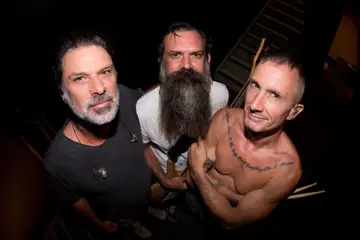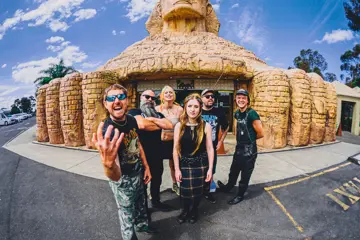alien: covenant

In Alien: Covenant, there’s face-huggers huggin’ face, neomorphs bursting out of chest cavities, and xenomorphs hunting humans like rats in a maze. But, after six Alien instalments, two Aliens vs Predator movies, and countless films openly indebted to Alien, the sight of these once-terrifying creatures splattering lower-rung cast members into bloody body-horror messes has lost its sense of menace.
For large stretches of Alien: Covenant, director Ridley Scott —responding, perhaps, to critiques of 2012’s ponderous, po-faced Prometheus— returns his now-extensively-prequel’d franchise to the realm of horror film. A character wanders off by themselves to wash up, take a piss, or have a smoke; and, sure enough, they’re soon toast. When two attractive spaceship workers are getting sexy in the shower? Why not just sign their death certificates before they even hit the hot tap.
After you’ve seen one act of murderous alien rage, though, you’ve seen them all. For a horror-film to work, it needs something else going on other than random blood sprays. A sustained mood. A singular parable. Mounting tension. Characters you can care about. Alien: Covenant has none of the above. The mood is wildly uneven. The symbolism is vague. The grand theme, if there is one, is some generic warning against playing god. And the characters, well, most are not even give that one standard, instantaneous signifier by which you can tell them apart.
Katherine Waterston is a... woman, sad that her husband died. Billy Crudup instructively tells us he’s a “Person of Faith”, which turns out to have no bearing on the story, but does allow him to say things like “O, ye of little faith” and talk about lambs and flocks. Carmen Ejogo is married to Crudup, and seems nice. Demián Bichir arrives on a foreign planet and lights up a cigar. Danny McBride(!) is a flagrant redneck caricature —named Tennessee, wearer of cowboy hat, knower of John Denver songs— but, hey, at least we know who he is. Less so of others. “My wife is down there!” McBride yells, at one point, of a crew member who’s landed on a hostile planet; to which the only response can be “wait, which one is his wife?”
Don't miss a beat with our FREE daily newsletter
Amusingly enough, the only actor that’s allowed to explore any kind of emotional range is the one playing characters (plural!) who aren’t human: Michael Fassbender. The film opens with a close-up of Fassbender’s eyeball, in a years-beforehand pre-Prometheus cold open in which the robo-Fass and his father/inventor, god-playin’ Guy Pearce, discuss high art and higher philosophy: the nature of existence, creation myths, the birth of sentience (left unsaid: who polishes the ultra-polished floors in Pearce’s palatial sci-fi-cliché digs). Fassbender then does double-time, as the dandy-ish, Lawrence-of-Arabia-channelling British android from Prometheus, and then his more functional, more robotic, more American successor. The best scenes in the film come when the dual ’Benders bond; one instructing the other in the world’s creepiest introductory recorder lesson.
Yankee Fass has flown in with the rest of the rag-tag crew, colonists headed to a far-flung planet for a pioneer’s terraforming mission. They’re waylaid midway by a tragic solar flare incident —as soon as they host their golden “energy recharge sails”, you can smell disaster— and an incoming John Denver jam from a nearby planet. So, running back the storyline of the original, they decide to touch down and take a look around and have aliens attach to their faces and lay spores in their bodies. They should’ve heeded Waterston’s warning that this place is “too good to be true”, in an obvious example of the film’s constant need for very-obvious foreshadowing (a close-up of a sign saying ‘Danger: Explosives’; or a shot of a Fassbender that telegraphs the twist ending a full act before it comes).
Upon landing, our crew don’t just find aliens, but a hooded, hiding-out Posh Fass; the ten-years-on sole survivor of the prior prequel, Prometheus. He’s spent the past decade learning to live amongst the aliens, lurking in a way-Goth serial-killer-ish lair equal parts Giger-esque charcoal sketches and von Hagens-like alien-specimen plastinations. And, in such, building the world-building bridge between the last film and, lingering in the future, the first run of Alien films; Scott out to both fashion an ongoing origin-story which moves towards the ‘events’ of the 1979 original, and to try and provide some of the same scares.
In attempting to balance these competing interests, though, Scott ends up satisfying neither. As standalone movie, it’s ultimately unsatisfying. There’s a host of standalone moments that work, and work well: a breathless, jittery, cam-shaking sequence of first-infection/infestation that barrels along marvellously; a flashback to alien spawn raining from the heavens on the decadent/Roman-orgy-worthy Engineers; a great moment where the rube-ish Crudup blithely sticks his face in an alien egg.
But nothing about Covenant coheres. The film is flaccid, messy, wildly uneven; both overthought and underdeveloped. It works to fashion a complex, nerdy mythology, but doesn’t think to address more basic tenets of storytelling. Whilst it’s full of references to —and sequences lifted from— the original Alien, there’s nothing here comparable to its economy, its simplicity, its mounting tension. Four decades removed from his original, Scott is working on a way bigger canvas, with far greater resources, to far lesser returns.















